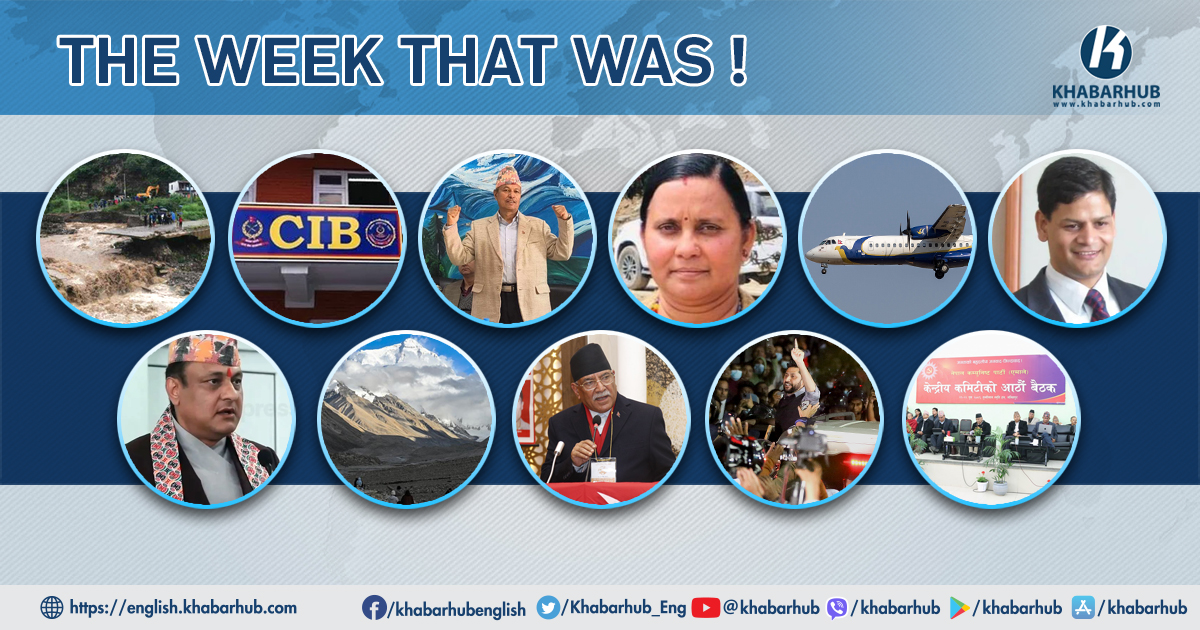KATHMANDU: Last week’s events reflect a blend of political developments, natural disasters, and societal issues, all contributing to Nepal’s complex political and economic landscape.
The political shifts within major parties, including Lamichhane’s release and the Maoist Centre’s unity efforts, show that party dynamics remain fluid.
Additionally, the country’s vulnerability to natural disasters, coupled with ongoing infrastructure and governance challenges, highlights the urgent need for long-term stability and comprehensive reforms.
Rabi Lamichhane’s release and ongoing legal issues: The release of Rabi Lamichhane, the Chair of the Rastriya Swatantra Party (RSP), after 84 days in police custody was a significant political event.
The Kaski District Court ordered his release on a Rs 6.5 million bail, which was promptly paid through a bank guarantee.
Lamichhane, alongside other accused individuals, will undergo medical checkups, indicating that the legal proceedings will continue to unfold in the coming days.
However, the internal struggles within the UML and its coalition partners will likely test the longevity and effectiveness of this government.
This release could influence the political dynamics in Nepal, as Lamichhane is a prominent figure in the opposition, and his party’s stance on various issues will likely shift as this case progresses.
Earthquake strikes Nepal-China border: A powerful 7.0 magnitude earthquake near the Nepal-China border jolted the region, with tremors felt across Nepal.
While no immediate damage reports have emerged, the earthquake serves as a reminder of Nepal’s vulnerability to seismic activity, especially in the Tibet region, where seismic risks are significant.
The national and local authorities are monitoring the situation, highlighting the need for continued earthquake preparedness and resilience-building in Nepal’s infrastructure.
China closes Mount Everest region: Following the earthquake in Tibet, China imposed a temporary ban on tourists in the Everest region, also known as Chomolungma in Tibetan.
While tourists and staff were reported to be safe, the closure of this iconic region for tourism emphasizes the vulnerability of major tourist destinations to natural disasters.
This development could have economic implications for Nepal, given the substantial tourism revenue generated by the Everest region, and could also heighten concerns over the safety of climbers and trekkers.
Expulsion of Bhim Rawal: The ruling CPN-UML party moved forward with internal purges, expelling former vice-chair Bhim Rawal and suspending two other prominent leaders for anti-party activities.
Rawal’s expulsion, following his opposition to KP Sharma Oli during the national convention, indicates ongoing factionalism within the UML.
This internal instability could affect the party’s cohesion and its political strategies, especially in the context of the ruling coalition’s efforts to ensure political stability.
Maoist Centre’s unity plans with leftist forces: The Maoist Centre, under the leadership of Pushpa Kamal Dahal ‘Prachanda’, announced intentions to unite with several leftist forces, including the Nepal Communist Party (Biplav), Unified Socialist, and others.
This move is strategically aimed at consolidating leftist power in Nepal and countering the dominance of the UML-led coalition government.
The success of this unity effort could significantly alter the political landscape, as a more unified leftist front could challenge the current government’s dominance.
BP Highway reconstruction: The estimated Rs 9.66 billion required for the reconstruction of the BP Highway following landslides in September 2024 highlights the growing infrastructure challenges in Nepal.
The damage to key transportation routes could further strain the economy and disrupt the movement of goods and services in the region.
The government’s response and allocation of resources to rebuild such infrastructure will be crucial to maintaining economic stability and addressing public grievances.
Sarbendra Khanal leaves UML: Sarbendra Khanal’s resignation from the CPN-UML marks another instance of political leaders distancing themselves from major parties.
As a former Nepal Police Chief, his departure could influence public perceptions of the UML, especially considering his commitment to justice.
Khanal’s decision to remain unaffiliated with any party might reflect growing dissatisfaction with the political establishment or a desire for independent influence.
Buddha Air’s narrow escape from disaster: A Buddha Air aircraft’s engine failure and subsequent emergency return to Kathmandu highlighted the ongoing safety concerns in Nepal’s aviation sector.
Although no casualties occurred, the incident serves as a reminder of the need for stricter safety protocols and maintenance checks, given the mountainous terrain and complex weather conditions in Nepal.
Hydropower investment surge: The completion of financial agreements for the Dhanakhola Hydroelectric Project, worth Rs 26 billion, signals continued growth in Nepal’s hydropower sector.
This is an encouraging development for the country’s energy sector, which is vital for sustainable development. The involvement of local communities in these projects is also a positive sign for inclusive development.
Online gambling raid by Nepal Police: The arrest of 53 individuals involved in an online casino gambling operation reflects Nepal’s ongoing efforts to curb illegal activities, particularly in the digital sphere.
The raid’s success highlights the Nepal Police’s commitment to addressing cybercrimes, which could improve public trust in law enforcement institutions.
Corruption allegations in cooperative sector: The case against Anjila Koirala, wife of the Chair of the Public Accounts Committee, over cooperative fraud underscores ongoing concerns about corruption within Nepal’s cooperative sector.
Koirala’s ability to post bail without detention suggests potential political ramifications and calls for greater accountability in both public and private sectors.
CPN-UML’s optimism about political stability: The CPN-UML’s expression of optimism about political stability following its coalition with the Nepali Congress reflects a broader ambition to address issues like corruption, good governance, and national development.
However, the internal struggles within the UML and its coalition partners will likely test the longevity and effectiveness of this government.









Comment